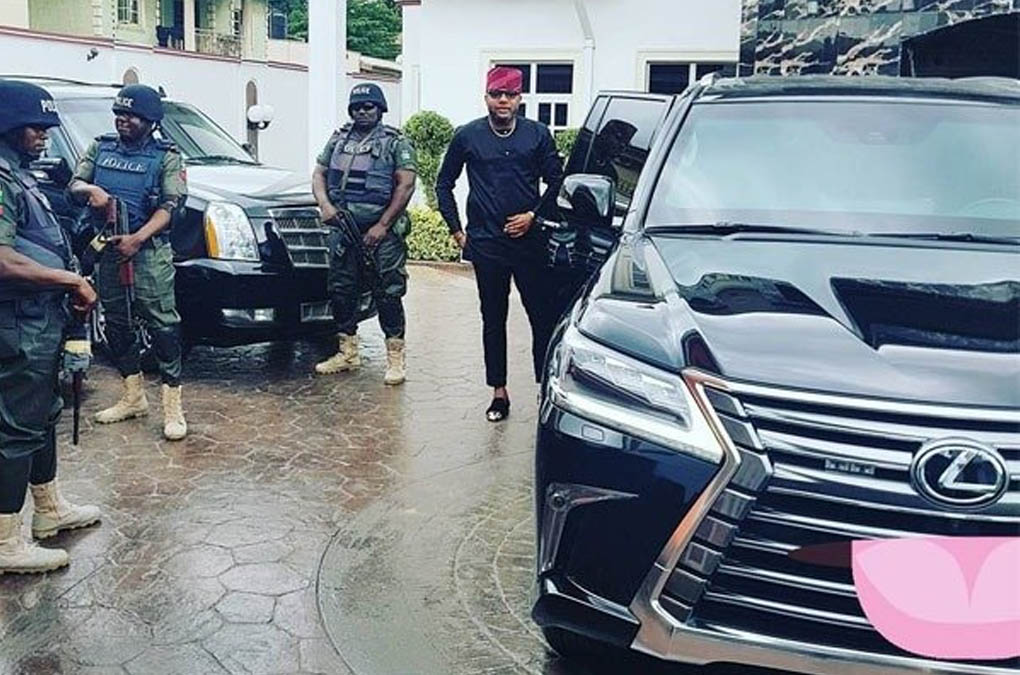If you’ve driven around Lagos, Abuja, or Port Harcourt lately, you’ve probably noticed a trend: Every Expensive Cars, whether a brand-new Toyota Prado, Lexus LX 600, or Rolls-Royce cruises by, it is rarely alone. Right behind, or in front, is a Toyota Hilux pickup packed with armed policemen, sirens on standby.
In today’s Nigeria, buying an expensive car worth ₦150 million and above almost automatically comes with a police escort package. It’s no longer unusual; it has become part of the culture of wealth and power. Whether it’s a politician’s convoy, a billionaire’s Rolls-Royce, or an oil magnate’s Prado, the pattern is the same, luxury SUV plus Hilux security detail.
The question is: why has this become the new normal, and what does it say about Nigeria’s car and security culture?
The Rise of the Escort Culture
Big Cars, Bigger Targets
Expensive cars in Nigeria have always carried status, but in recent years, they’ve also painted a target on their owners’ backs. With kidnappings, robberies, and carjackings on the rise, those who can afford a ₦150 million ride often see escorts as non-negotiable.
A brand-new Lexus LX 600 costs nearly ₦200 million after duties. A Rolls-Royce Cullinan pushes past ₦400 million. Even the Toyota Prado, a longtime favorite of Nigeria’s elite, now commands prices upwards of ₦120 million for newer models. In a country where the average citizen struggles with fuel costs, such vehicles scream power and wealth, and that attracts attention.
From Politicians to CEOs
What used to be the reserve of top government officials has trickled down to wealthy business executives, oil and gas moguls, and even “old money” families. Today, it is common to see a private businessman’s G-Wagon escorted by two or three Hilux trucks filled with police officers.
This is not just about protection; it is also about showing status. The convoy sends a clear message: this is someone important.
SUVs That Demand Escorts
Not every car on Nigerian roads comes with a security detail. The trend is concentrated on high-value SUVs and luxury cars.
Toyota Prado
The Prado has become almost synonymous with Nigerian elites. Governors, ministers, and company directors all ride in Prados. It’s rugged, reliable, and instantly recognizable. Once you buy a brand-new Prado, chances are you’ll soon be pairing it with at least one police Hilux.
Lexus LX 600
This is the SUV that screams authority. At nearly ₦200 million, the LX 600 is not just transportation; it is a rolling statement of wealth. Every LX you see on Nigerian roads is almost always flanked by escorts, sometimes three Hilux trucks deep.
Rolls-Royce
For the true high-rollers, Rolls-Royce ownership is a declaration of untouchable wealth. Whether it’s the Cullinan SUV or a Phantom sedan, these cars are never seen alone. Convoys with heavily armed escorts are standard, ensuring that the owners glide through traffic without disturbance.
Why Escorts Have Become a “Package Deal”
Security First
The reality is that Nigeria’s security climate has forced many wealthy individuals to prioritize safety. Kidnapping for ransom remains a huge concern, and flashy cars naturally attract unwanted attention. Escorts provide both deterrence and immediate response.
A Show of Power
For many elites, escorts aren’t just about safety, they’re about optics. A convoy of SUVs and Hilux trucks cutting through traffic with sirens blaring projects power, influence, and authority. In Nigeria, where appearances matter, the convoy culture is as much about ego as it is about protection.
Social Signaling
There is also an element of social signaling. Pulling up to a wedding in Abuja or a high-society party in Lagos with a convoy announces your status before you even step out of the car. It says: I belong to the upper echelon.
Real-Life Nigerian Scenes
- Victoria Island, Lagos: It’s not uncommon to see a convoy of two Prado SUVs, a Hilux escort, and sometimes even an ambulance for high-profile events.
- Abuja Airport Road: Every evening, convoys of expensive cars with police escorts ferry politicians and business moguls from meetings to residences.
- Port Harcourt Oil Routes: Oil company executives often drive brand-new Lexus LX 600s with at least three armed escorts due to heightened risks in the region.
For ordinary Nigerians, these convoys are both fascinating and frustrating. They glide past traffic jams with ease, leaving everyone else stuck. But at the same time, they add to the spectacle of Nigeria’s road culture.
The Economics Behind It
Hiring armed police escorts isn’t cheap. While official arrangements vary, many wealthy individuals pay retainers to the police for permanent security details. In some cases, private security companies supplement these escorts, but the Hilux full of policemen remains the most visible symbol.
For elites, the cost of escorts is just another line item, like fueling a ₦200 million SUV. If you can afford the car, the escort is almost expected.
What This Says About Nigeria
This trend reflects more than just wealth. It highlights:
- Security gaps: Ordinary citizens can’t access such protection, deepening the divide between rich and poor.
- Status obsession: In Nigeria, expensive cars are not just transport; they are identity markers.
- Normalization of escorts: What once seemed excessive now feels normal. Spotting a luxury SUV without an escort Hilux almost looks incomplete.
Conclusion
In Nigeria today, owning an expensive car is no longer just about the car itself. It comes with a culture of escorts, convoys, and the constant display of power. Whether it’s a brand-new Toyota Prado, a Lexus LX 600, or a Rolls-Royce, the rule seems to be the same: no Hilux, no respect.
For some, this is a worrying symbol of insecurity and inequality. For others, it’s simply the way of life for the rich and powerful in a country where appearances speak louder than words. Either way, it’s clear: the convoy culture is here to stay.

